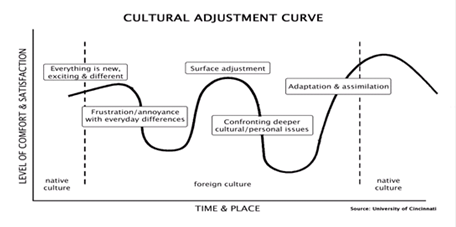This is a letter we used to send Au Pairs who are preparing for their coming Au Pair trip to China, we now make it public, we believe many of you may wonder how a cultural shock can be solved during Au Pairing. That’s why we have consultants with psychological background, we believe all candidates can be consulted or helped at least.
Dear Au Pair,
Welcome to China and we are quite glade you choose us. We sincerely hope you will enjoy your stay in China. In the meanwhile, AiG team will support in your whole stay. In this letter we will state you the ways of solving culture shock please feel free to contact your coordinator for any questions.
Cultural Adjustment to China
Culture shock is a normal response among cultural exchange participants. It is the emotional and behavioral reaction to living and working in another culture. The culture shock can feel like a roller coaster ride as the physical, emotional and mental highs and lows come in waves. Everyone will experience culture shock differently, to varying degrees and for varying lengths of time.
Stage 1: Everything seems exciting, interesting and new.
Stage 2: Cultural fatigue. The Au Pair starts to see differences and begins to feel uncomfortable. The Au Pair becomes tired, both physically and mentally.
Stage 3: Surface adjustment. The Au Pair begins to understand the people and their ways. The Au Pair feels more comfortable.
Stage 4: Hidden problems. Although outwardly the Au Pair seems to be fitting in, the Au Pair begins to question certain aspects of the culture. The Au Pair is homesick and possibly has conflicts with family and friends. The Au Pair may feel dissatisfied and thinking, “Everything would be better if only…”
Stage 5: Fitting in. The Au Pair accepts the host culture and feels comfortable with the way of living. The Au Pair may even feel like a native of the host country.
Stage 6: Going home. The Au Pair will begin to have mixed feelings about going home.

Au Pairs and Host Families will need to be patient and allow themselves the time to adjust to all the changes and differences between cultures. Brainstorming coping strategies for dealing with the inevitable culture shock can be a great and fun way for the Au Pair to get to know the Host Family, while at the same time helping deal with homesickness. No matter what happens, a positive frame of mind is a great help.
2-Month Adjustment Period
When an Au Pair first arrives to live with the Host Family, he or she may experience some difficulties, such as feeling homesick, difficulty adjusting to a new environment, feeling lonely, disliking American food, or difficulty understanding an aspect of American culture. Such feelings are common for international visitors on exchange programs.
The Au Pair can seek assistance through this period from the Host Family or Local Community Representative. AiG Local Community Representatives are trained to spend extra time in the first two months counseling and offering assistance to Au Pairs and Host Families. The AiG Local Community Representative is available to be a neutral third-party and impartial advocate for both the Au Pair and Host Family. If the Au Pair is having any difficulties, he or she should feel comfortable contacting the LCR for assistance.
Conflict Resolution
Most problems can be prevented before they begin through open communication, flexibility and patience by both the Au Pair and Host Family. However, all families have disagreements, as conflict is a natural part of family interaction. If the Au Pair has a conflict or problem with the Host Family that he or she is unable to easily resolve alone, the Au Pair should seek assistance from the Local Community Representative. AiG Local Community Representatives have been trained to assist Au Pairs and Host Families through mediating disagreements and resolving conflicts as a neutral third party.
3 steps for resolving conflict:
1. The Au Pair should talk to the Host Family to try to resolve the issue. The Au Pair should speak openly but politely.
2. If speaking to the Host Family does not solve the problem, the Au Pair should ask for assistance from the AiG Local Community Representative.
3. After giving the situation some time, if the problem persists, the Au Pair should contact your office or AiG with a written description of the problem.
Rematch
Rematches are rare, considering that Host Families generally are very committed to the program. Every attempt should be made to work out differences before a rematch is considered. Rematching typically only occurs in cases of extreme conflict or unacceptable behavior on the part of the Host Family. No relocations are made during the first two months unless a Host Family has breached their contract. If problems arise which cannot be resolved even after thorough counseling by the Local Community Representative and AiG , AiG will try to relocate the Au Pair with a new Host Family.
During the rematch transition, no requests for specific geographic locations will be accepted. All outstanding financial obligations such as telephone bills and medical bills must be paid to the Host Family before the Au Pair departs. The Au Pair must be readily available for an interview. During this transitional period, the Au Pair will stay in a single room the AiG provided.
While every attempt will be made to find a new Host Family, AiG cannot guarantee a rematch will be made. If after two weeks, no suitable family has been found, the Au Pair will be required to return to his or her home country. The Au Pair will be required to purchase the international flight home at his or her own expense.


